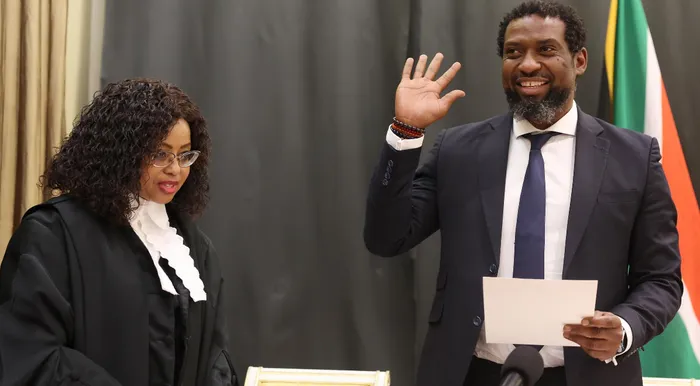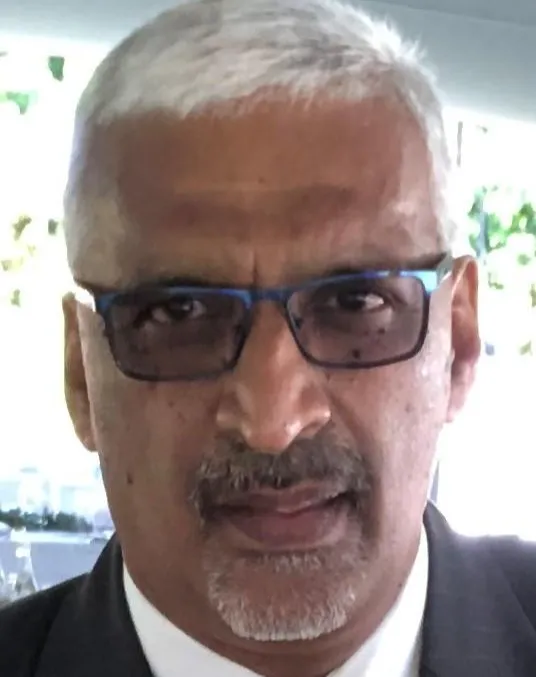Navigating the complexities of higher education: the path ahead for Buti Manamela
New hope

Western Cape High Court Judge President Nolwazi Penelope Mabindla-Boqwana conducted the swearing-in of newly-appointed Higher Education and Training Minister, Buti Manamela.
Image: Kopano Tlape | GCIS
IN MATURE democracies, people openly call out politicians who err and underperform. Such politicians usually resign immediately when evidence of their indiscretions, such as nepotism or financial mismanagement, becomes public knowledge.
In South Africa, however, many defaulting politicians often hold on to their portfolios despite clear evidence of malpractice. The former minister of higher education, Dr Nobuhle Nkabane, is a case in point where, despite intense pressure from opposition parties, student organisations and civil society about blatant misuse of power in the appointment of SETA board members, she held on to her position.
While President Cyril Ramaphosa is often rightly accused of not being sufficiently decisive, he must be commended for taking a bold decision to fire this controversial minister. We may not know with any degree of certainty whether the president's decision was a reaction to the public outcry regarding the minister’s unashamed cadre deployment tactics, or whether he acted from a deeply ethical and moral principle, especially given the controversy surrounding the president’s own financial affairs.
The issue of working from high ethical and moral principles is important, and we should hold the new minister, Buti Manamela, and his deputy, Dr Nomusa Dube-Ncube, to such high values. It is rare to find elected politicians in the post-apartheid era who are not shrouded by some controversy.
The new higher education minister, Manamela, is no exception.
During his tenure as deputy minister of higher education since 2019, he has been accused of sidestepping accountability, making limited progress on developing student support systems and downplaying key fractures in higher education. Arguably, his most telling misstep was in September 2024, when he was summoned to appear before Scopa, the Standing Committee on Public Accounts.
A Scopa hearing is a critical tool for financial oversight in South Africa’s democracy. Scopa had scheduled a hearing to question the Department of Higher Education and NSFAS (National Student Financial Aid Scheme) about major financial mismanagement issues, especially missing funds and unresolved student appeals.
Manamela’s absence was seen as evading accountability, especially since he was the political head responsible for NSFAS and the National Skills Fund at the time. It is important to note that while Manamela has been strongly criticised in political forums, there is no record of criminal proceedings or any guilty verdict against him for corruption or financial malpractice.
Buti Manamela might well be considered a new generation politician.
At 46, he is 26 years younger than Ramaphosa, who appointed him. He has a strong activist background, serving as the national secretary of the Young Communist League for 11 years and leader of the South African Students Congress (Sasco). With this kind of ideological upbringing, one might expect that his activist project would be that of championing the rights of the poor and working class.
To allay the fears of South Africans who might begin to fear the consequences of being led by a young communist, it must be noted that the SACP is a communist party in theory. It operates as a socialist actor in South Africa’s democratic and capitalist system rather than advocating for revolutionary overthrow. From an analysis and observation of Manamela’s political disposition, it is clear that he has a sober understanding of the extent to which absolute communist aspirations might be achieved in the SA context.
Manamela has a vibrant social media presence, regularly offering commentary on a range of issues that concern his portfolio through podcasts and other digital media platforms. His recent piece in June this year, titled "Rethinking research funding in a shifting geopolitical landscape”, reflects the thinking of an individual who understands South Africa’s financial vulnerability, especially given the country’s position on social justice for oppressed peoples across the world.
He has also been unequivocal in his position on xenophobia that continues to rear its ugly head in South Africa. In the five years that he served as the deputy minister, Manamela should have a fair knowledge of this portfolio. He is a public figure, regularly representing South Africa on the international stage. He has revealed a particular interest in moving the country firmly into the digital arena.
His presentation at the recent World Digital Conference in China reflects the insights of an individual who understands the issue of digital justice and digital intelligence as an enabler, especially for the poor and underclass. He recognises the need to partner with willing international collaborators in the proverbial Global South, as it relates to technology sharing, international student exchange programmes and joint certification of technology-intensive academic programmes.
To his credit, Manamela has identified the Technical Vocational Education and Training (TVET) sector as crucial to the development of the South African economy, by championing TVET and community colleges as powerful educational alternatives to mainstream schooling and university education and as an answer to youth unemployment. He recognises the ageing artisan cohort in South Africa and the importance of neutralising the stigma around technical and vocational education.
This sector, however, is notorious for its underperformance, poor infrastructure, antiquated programmes and under-qualified teaching personnel. While there are small pockets of excellence in this sector, Manamela has to aggressively work at improving the quality and standards of course offerings across the over 50 TVET Colleges.
The university sector in South Africa faces several challenges.
Apartheid-era legacies continue to impact access for black and marginalised communities. Despite NSFAS funding, high tuition, accommodation shortages and living expenses remain as key barriers. Per-student government subsidies have declined in recent years, pushing universities to rely more on tuition and third-stream income for financial sustainability. At the same time, frequent student protests have brought pressure to reduce or eliminate fees, challenging institutional budgets.
Inefficiencies in NSFAS administration, delays in payments, and eligibility concerns are immediate issues that the minister must prioritise. Institutional instability caused by governance crises and poor management continues to plague many universities. The balancing of institutional autonomy with public accountability will always be a contentious issue.
Manamela has to be decisive and even-handed, especially in the face of powerful lobby groups in historically white institutions where white privilege continues to be the clandestine agenda. The racial transformation of these university councils, senates, academic and support staff in these public institutions is an agenda that will contribute towards transforming the university sector in line with the aspirations of the constitution.
Attracting and retaining skilled academics, many of whom are lost to the private sector or choose to ply their trade abroad, is a brain drain dilemma that Manamela has to open up intellectual conversations about. Under-qualified academic personnel, inadequate supervision capacity, and research funding hinder postgraduate growth and academic renewal, which South Africa, as a developing nation, desperately needs.
Research capacity is very uneven, with research outputs concentrated in a few research-intensive universities. What is clear is that all universities in South Africa cannot be research institutions and that important conversations need to happen on the merits of investing in bringing parity in research capacity across all universities versus the creation of a differentiated higher education system comprising teaching universities, universities of technology and research-led universities.
Artificial Intelligence offers unprecedented opportunities to address South Africa's higher education challenges through enhanced efficiency, personalised learning, predictive analytics, and automated governance systems. Harnessing the potential of AI across the higher education sector’s strategic priorities, namely, financial sustainability, systemic equity and institutional capacity development, should be key objectives for the ministry.
Minister Buti Manamela is an athlete who has completed the Comrades Marathon. This is a significant personal accomplishment which requires sustained hard work (training), discipline and endurance. It is hoped that he can carry these traits into the important portfolio that he now leads.

Professor Suriamurthee Maistry
Image: Supplied
Professor Suriamurthee Maistry is a Decolonial and Critical Curriculum Scholar in the School of Education at the University of KwaZulu-Natal.
** The views expressed do not necessarily reflect the views of IOL or Independent Media.
Related Topics: